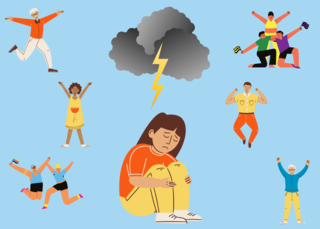Depression
Depression Changes How We Use Our Memory
The way we use our memory to imagine our future, and how depression impacts it.
Posted March 29, 2021 Reviewed by Davia Sills
Key points
- We rely on our memories to imagine what our future will look like.
- People with clinical depression have more negative memories and are more influenced by them when picturing the future.
- This negative outlook on the future could be one reason why people with clinical depression have a hard time finding energy to do things.
Each one of us is constantly creating a story of who we are, who we were, and who we are going to be. We often find ourselves thinking back on events we have experienced and trying to predict the circumstances of our futures. Scientists call this process in which we think of our past and imagine our future “autobiographical thinking.” In fact, some scientists believe that the goal of our memory is to help us predict the future.

When we think back over the course of our lives, we can certainly recall both positive and negative events that we have experienced. For individuals diagnosed with clinical depression, however, the recollection of past events is more painful: Individuals with high levels of depression consistently rate past events in their lives as more negative and less positive than individuals with low levels of depression (Anderson & Evans, 2015; Marsh et al., 2019). These findings are not surprising, considering that in most cases, clinical depression emerges after extremely stressful events (e.g., loss of a loved one, severe traumatic events). In other words, individuals with clinical depression have more negative memories, which may contribute to a decreased capacity for psychological adaptation and lower confidence about their ability to overcome life’s obstacles (McAdams and McLean, 2013).
In addition to this negative recall of the past, individuals with clinical depression also exhibit more negative expectations about their own futures. Individuals with high levels of depression rate anticipated future events as more negative, have less positive thoughts about the future, and perceive future events as less important than individuals with low levels of depression (Anderson & Evans, 2015; Marsh et al., 2019). This negative attitude towards the future is likely to affect mood and motivation for individuals diagnosed with clinical depression: If you have negative expectations, it’s likely you’ll become more sad and discouraged—and it makes it harder to find the energy to go out and do things. Individuals with depression have less confidence in their ability to succeed in the future, and thus believe themselves to be less capable of achieving long-term goals, such as quitting smoking (Haukkala et al., 2000).
Bridging the Gap Between Past and Future
No study has directly examined if how we think about our past influences how we think about our future. Understanding how we use our memory to imagine our future will help us discover how our past experiences can shape our futures. Furthermore, understanding how clinical depression affects this process may elucidate important insights that could improve the ability of mental health professionals to treat depression.

Researchers Reuma Gadassi Polack, Tanya B. Tran, and Jutta Joormann (the author of this post) from the Yale Psychology department and Alpert Medical School of Brown University set out to accomplish this goal. The researchers examined whether the recall of past events is related to future expectations in individuals with and without clinical depression.
We Believe the Past Will Repeat Itself
The researchers studied 32 people with clinical depression and 32 people without depression. Participants completed a task in which they were shown both positive and negative cues and asked to recall and describe an autobiographical memory pertaining to the cue.
For example, participants were given the positive cue of “a successful attempt” and were asked to describe a memory related to this cue—in this case, a positive memory of a time they attempted to do something and were successful. Similarly, negative cues such as “a stressful day” had participants describe negative memories of events they had experienced. Following recall, participants rated the memory on positivity, the frequency of the event occurring to themselves and to others, and—to investigate the link between memory and future event prediction—likelihood of recurrence.

As predicted, participants in the clinical depression group reported negative events happening to them at a higher frequency than did participants in the non-depressed group, while the opposite was true for reports of the frequency of positive events. And this finding—of a more negative memory of the past—extended into future expectations: Individuals with clinical depression expected negative events to recur more frequently than positive events, whereas individuals without clinical depression expected positive events to recur more frequently than negative ones (Gadassi Polack et al., 2020).
Another interesting finding came up when participants were asked how often events happen to them, and how often they happen to other people. Participants with clinical depression rated negative events as happening to themselves more frequently than to others and positive events as happening to themselves less frequently than to others. In contrast, participants without depression rated positive events as happening to themselves about as frequently as to others and negative events happening to themselves less frequently than to others.

This shows that while individuals without depression may consider themselves to be more fortunate than others, depressed individuals often see themselves as being much less fortunate than they perceive others to be. This may contribute to the sense of “otherness” depressed individuals feel when they perceive themselves as being abnormal or different from others (Appelqvist-Schmidlechner et al., 2016). This could increase feelings of loneliness and low self-esteem, reinforcing these common symptoms of depression.
Crucially, the researchers did indeed find a link between the memory of the past and expectations for the future. The results showed that for both groups, positive past events that occurred more frequently were expected to happen again in the future. However, only individuals with clinical depression believed negative events that happened more frequently will happen again.
In other words, only individuals with clinical depression rely on negative aspects of the past when predicting the future. Since individuals with clinical depression recall negative events as having happened to them more frequently than do individuals without clinical depression, they therefore have more negative expectations regarding the future. They have more negative expectations of social events and less confidence in their ability to be successful in the future.
Implications of the Study
These are quite significant results. New knowledge about the relationship between the perception of autobiographical memories and future event prediction in depression could provide insights as to how to improve treatments for clinical depression. The experimental results add to the existing literature around past- and future-oriented autobiographical thinking by establishing the relationship between them in individuals with and without clinical depression. These findings thus have important implications:
- Individuals with clinical depression have more negative memories and future expectations than do individuals without clinical depression, which may contribute to the persistence of the negative mood that characterizes depression.
- The link between negative event recollection and future expectations may help to explain social avoidance (e.g., not wanting to go out with friends) in individuals with clinical depression, who recall more negative social memories and therefore expect to enjoy social events less.
- The degree to which individuals with clinical depression base their future expectations on their perception of past events may be an important target for intervention.
From the data collected by Gadassi Polack, Tran, and Joormann, it is clear that individuals with clinical depression make negative predictions about the future based on their recollection of negative past events, while individuals without clinical depression rely mostly on their positive past events. We are optimistic about how this finding may inform future interventions for depression.
Kendall Ertel, an undergraduate student at Yale University, contributed to the writing of this post.
LinkedIn image: chuanpis/Shutterstock. Facebook image: fizkes/Shutterstock
References
Anderson, R. J. , & Evans, G. L. (2015). Mental time travel in dysphoria: Differences in the content and subjective experience of past and future episodes. Consciousness and Cognition, 37, 237–248. doi: 10.1016/j.concog.2014.05.006
Appelqvist-Schmidlechner, K., Wessman, J., Tuulio-Henriksson, A., & Luoma, M. (2016). “Experiences of otherness among students diagnosed with depression and/or anxiety disorder.” International Journal of Psychosocial Rehabilitation, vol. 20, no. 2, 39-54
Haukkala, A., Uutela, A., Vartianen, E., Mcalister, A., Knekt, P. (2000). “Depression and smoking cessation: The role of motivation and self-efficacy.” Addictive Behaviors, vol. 25, no. 2, 311-316, doi: 10.1016/S0306-4603(98)00125-7
Marsh, L. , Edginton, T. , Conway, M. A. , & Loveday, C. (2019). Positivity bias in past and future episodic thinking: Relationship with anxiety, depression, and retrieval-induced forgetting. Quarterly Journal of Experimental Psychology, 72 , 508–522. doi: 10.1177/1747021818758620
McAdams, Dan P., and McLean, Kate C. (2013) “Narrative Identity.” Current Directions in Psychological Science, vol. 22, no. 3, pp. 233–238, doi:10.1177/0963721413475622.
Reuma Gadassi Polack, Tanya B. Tran & Jutta Joormann. (2020) “What has been is what will be? Autobiographical memory and prediction of future events in depression.” Cognition and Emotion, 34:5, 1044-1051, doi: 10.1080/02699931.2019.1710467




